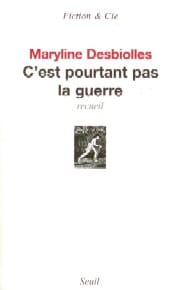 An investigation? A testimony? If Maryline Desbiolles takes so much effort to understand the Ariane, a neighborhood known as “difficult” in the city of Nice, it’s because she sees a real mystery to unravel there. Perhaps even a treasure to discover. The author poses as a non-conquering explorer of a forgotten city, swallowed up by the relentless march of time. Between the “wasteland” and the “out of space,” according to the intellectual idea one has of it. She refrains from judging: she simply listens and lets the reader decide, alone, as if caught in the trap of his own discoveries.
An investigation? A testimony? If Maryline Desbiolles takes so much effort to understand the Ariane, a neighborhood known as “difficult” in the city of Nice, it’s because she sees a real mystery to unravel there. Perhaps even a treasure to discover. The author poses as a non-conquering explorer of a forgotten city, swallowed up by the relentless march of time. Between the “wasteland” and the “out of space,” according to the intellectual idea one has of it. She refrains from judging: she simply listens and lets the reader decide, alone, as if caught in the trap of his own discoveries.
By giving voice to about “ten different voices”, she tries to orchestrate a human chant, a polyphony of cultures, stories, and journeys from around the world that all, ultimately, culminate in Ariane. A terminus always has undertones of sadness and melancholy. The colorful past of its residents seems more accessible, less unspeakable to the author than their future, probably darker. From Arianencs of “native” origin to those who come “from elsewhere,” all must now immerse themselves in the life of the neighborhood. The woman who “plays at being French,” the author recounts, is deemed “a foreigner.”
Each of the experiences collected in her “little black notebook” aims to offer hope but often carries with it a load of violence and harshness: words rain down like blows, the rules of the neighborhood are enforced by force, personal belongings disappear as if whole sections of a previous, distant and happy life suddenly vanish. In order to avoid the reader’s rejection, likely to be gripped by the somewhat disconcerting nature of the stories, Maryline Desbiolles introduces a pause, offers a breathing space: her poetic writing allows her to tint this seemingly grey area with a palette of colors, making the inconceivable almost common. At the risk of making it appear acceptable.
To further decrypt or as a self-imposed supplementary safety measure, she adds a mythological dimension. She transposes the “reality” of the Nice city onto Mount Olympus. Visited like an island at the edges of the world, Ariane becomes a labyrinth that shelters the monstrous Minotaur. But Ariane also embodies the one whose thread will serve as a guide to the city’s savior. Because “the layout of the neighborhood is very simple,” she admits, “but when you’re inside the Ariane, you don’t know where you are.” The symbolism, as might a patient threatened by a psychological overflow, is welcome.
However, a regret is felt by Maryline Desbiolles: among the ten voices interviewed are those as numerous as they are courageous of women, punctuated by the words of a wise African and a gypsy dancer. But from those who dictate the rules and enforce them, those who are at the very heart of the system, she has learned nothing. She could only observe them. From a distance.
Maryline Desbiolles, “It’s Not War, Though”, Collection, Coll. “Fiction & Co.”, Seuil Editions, 2007, 124 p., 13 Euros.


